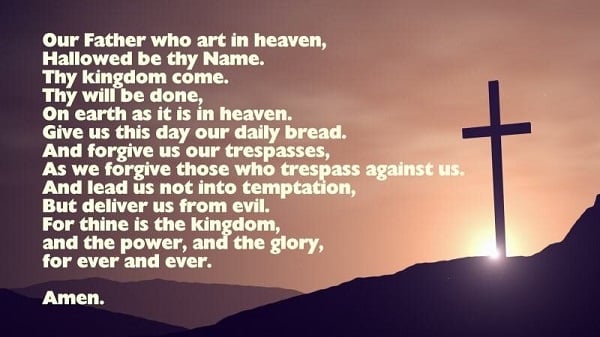
We have been examining the Lord’s Prayer in the past few weeks. You can find it in Matthew 6 and Luke 11. They differ slightly as we have one eyewitness, Matthew, recording what he heard whereas Luke writes his gospel account after interviewing eyewitnesses. When we recite this prayer, the version we quote is closer to Matthew’s version. It is true that over the centuries, believers have added an ending (sometimes called a “doxology”) that seems to round out Jesus’ prayer.
That doxology is: “For thine is the Kingdom and the power and the glory forever and ever, Amen.” Most point to 1 Chronicles 29:11 as that's where those words are prayed by King David.
Some have called this prayer, “the disciple’s prayer” since they are the ones who asked for Jesus to teach them how to pray like John the Baptist taught his disciples (Luke 11:1). Many books have been written on this poetic, powerful prayer that encapsulates the Kingdom of God in a memorable set of requests to God.
One of the most fascinating aspects of this prayer that stood out to me as I studied it again, is understanding that Jesus expertly ties this prayer into prayers that the Jewish people were already praying. Jesus, who is a master teacher, takes what the people already know and stretches it out to tell them something new that they don’t already know. Let me give you a few examples of how Jesus wasn’t afraid to use what was true in the culture and faith practices of His day to help others grow.
"Hallowed by Thy Name"
Hallowed means holy and set apart, other, higher and greater than all others. To do something or pray for something “in the name” of someone invokes their authority and power. Imagine a police officer yelling at a fleeing suspect, “Stop in the name of the law!” An officer would be laughed at if he said, “Hey, stop in the name of Jeff!” Jesus is recognizing that the highest authority of God is like no other.
God commands his people not to use his “name in vain” in the ten commandments. When we baptize people who have entered into relationship with Jesus, we baptize them “in the name of the Father, the Son and the Holy Spirit (Matthew 28:19-20).”
The Jewish Quddish prayer was the holy prayer of the synagogue (where Jews worshiped together in the first century). It says, “Exalted and hallowed be His great name in the world which He created according to His will…”
"Thy Kingdom Come, Thy will be done"
Jesus came to “proclaim and bring the good news of the Kingdom of God (Luke 8:1).” His main message was that the Kingdom of God had arrived. John the Baptist paved the way for Jesus, the Messiah, saying,
“Repent for the Kingdom of Heaven is at hand (Matthew 3:2).”
Many have said, “The Kingdom of God is now and not yet.” Once Jesus arrived on earth the Kingdom of God was fully present, but it did not saturate every person, or every inch of God’s good world.
When we surrender our lives to Jesus and trust Him as our Savior, His Kingdom comes fully into our lives and the Holy Spirit comes to live inside us. While I follow Jesus, His Kingdom is being lived out in my life – but I also frequently find small pockets of resistance in my heart and soul where I have not fully yielded to Jesus as my King. The Kingdom has not fully saturated 100% of my life yet, but day by day, the Holy Spirit leads me into all truth and shows me where those pockets of resistance still exist. The Bible says that as imitators of Jesus, we are being transformed day by day to look more and more like Jesus – it’s a lifelong journey where God will be shaping us until we are with Him in heaven (2 Cor. 3:18).
The Jewish Quddish prayer also says, “May he rule His Kingdom in your lifetime and in your days and in the lifetime of the whole house of Israel, speedily and soon.” The Jewish people were longing for their Messiah and praying that He would arrive in their time. This is why they were hopeful even though they had been overthrown by other nations and been taken into exile.
"Forgive us our trespasses, as we forgive those who trespass against us"
Forgiveness is a key concept in the Kingdom. God initiates a whole system of animal sacrifices so that the sins of humans could be forgiven. Then Jesus comes as the lamb of God, who lays his life down as the perfect, sinless sacrifice to pay the penalty for our sins. Jesus dies as a substitute for us – in our place. We deserve death but we receive mercy from God. Sin creates a debt that we can never pay, but God, Himself, leaves his place in heaven to suffer and die for us.
Immediately following this prayer are these two verses:
Matthew 6:14–15 (NIV)
14 For if you forgive other people when they sin against you, your heavenly Father will also forgive you. 15 But if you do not forgive others their sins, your Father will not forgive your sins.
Jesus’ prayer is a reminder that since Jesus forgave our sins, we must imitate Him and forgive others their sins as well. In this loving way, others see the value of mercy in His Kingdom.
One of the prayers of Judaism says, “Forgive your neighbor the wrong he has done, and then your sins will be pardoned when you pray.”
"Lead us not into temptation"
God tests His followers (Heb. 11:7; John 6:5-6; James 1:2-3; 1 Peter 1:6-7), but James 1:13 tells us that God doesn’t tempt us. So, God tests us by putting us in situations where we must make a choice between right and wrong. (See Deuteronomy, chapter 30, “choose life”).
The book of Job shows us that being close to God (and doing all the right things) will not spare us from temptation, trials or affliction. The Holy Spirit led Jesus into the desert in Matthew 4:1 to be tempted by the Devil.
Jesus is helping us understand that suffering in this life is to be expected and following Him doesn’t make everything painless. Actually, it will probably pave a more difficult path as you will be persecuted by others by following Jesus.
When Jesus was in the Garden and was tempted to bypass suffering on the cross, Jesus doesn’t sin when He’s tempted to the easy road, but he does pray and ask God the Father "if this cup can pass from me,” but ultimately in prayer, Jesus trusts His Father and prays, “your will be done.”
In the Lord’s Prayer, we see that it’s okay to pray that our testing not become an occasion for temptation. And this is an echo of the morning and evening Jewish prayer:
“Bring me not into the power of sin
And not into the power of guilt
And not into the power of temptation
And not into the power of anything shameful.”
I’m so thankful to have a Savior who understands temptation. He was tempted in every way and yet did not sin. (Heb. 4:15). Jesus leads us to pray in a way that we recognize that this life will not be easy.
As I pray the first three phrases of this prayer, my gaze is upward to the glorious nature of God. The last three phrases bring my eyes to my relationships with others and I am compelled to ask for the Kingdom of God to be played out fully. It feels really good to have permission to pray that God will keep us from temptation. If we are tempted, we can be assured that God will provide a way of escape in our temptation (James 1:13).
The message of the Kingdom was already being prayed by the Jewish people, and it’s beautiful how Jesus uses familiar prayers and language to inaugurate his Kingdom, in His prayer. If you haven’t memorized the Lord’s prayer, I want to challenge you to do so, and to pray it every day on your own and also with the church when we gather and pray together.
We invite you to our Sunday Morning Worship Service at 10:00 a.m. in the Dome.
You can also live stream our service on Facebook and YouTube at 10:00 a.m.
If you missed last Sunday's message from the "How to..." series, click here.
You will find all our blogs, podcasts, and Sunday services and messages on our website ncchico.org which you can access at any time. Sunday messages are under the Media tab. Blogs and podcasts are listed under Pastor Andrew's Corner.
Need encouragement? Text the word Encourage to 530.296.3689 to receive an encouraging scripture or quote from me several times a week that is sent right to your phone.



